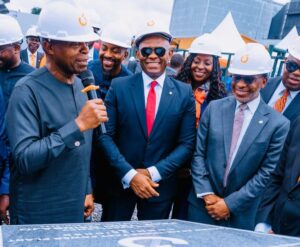 In a significant declaration, Vice President Yemi Osinbajo (SAN) expressed confidence that Nigeria has the potential to emerge as one of the world’s premier power markets through increased investments and advancements in the electricity value chain. Delivering the statement on behalf of President Muhammadu Buhari, Osinbajo made these remarks during the official commissioning of the AFAM 3 Fast Power Project, a 240MW power plant in Port Harcourt, Rivers State.
In a significant declaration, Vice President Yemi Osinbajo (SAN) expressed confidence that Nigeria has the potential to emerge as one of the world’s premier power markets through increased investments and advancements in the electricity value chain. Delivering the statement on behalf of President Muhammadu Buhari, Osinbajo made these remarks during the official commissioning of the AFAM 3 Fast Power Project, a 240MW power plant in Port Harcourt, Rivers State.
In a press release issued by his spokesman, Laolu Akande, the Vice President outlined the prospects for Nigeria’s power sector, stating, “We have all the ingredients to create one of the best power markets in the world. I am also confident it will happen within our lifetimes. The challenge before us now is for the industry to leverage the improved commercial environment that has been created to sustainably supply electricity and improve service to all citizens. This administration has made significant strides in this direction.”
Highlighting the government’s efforts in the sector, Osinbajo cited the inflow of new investments into the power value chain in recent years. Notable transactions include the acquisition of Yola Disco by Quest PLC in 2020, valued at N19 billion. Furthermore, he mentioned the approval by the National Council on Privatization (NCP) of a 30-year concession on the Zungeru Hydro Power Plant at an annual rate of $70 million. Overall, Osinbajo underscored the improving trajectory of the Nigerian electricity supply industry.
The Vice President also commended the Nigerian Electricity Regulatory Commission (NERC) for successfully executing its bi-annual review processes since 2020, a departure from previous practices. He contrasted the burden of N584 billion in subsidies borne by the Nigerian government in 2019 with the current progress. Noteworthy initiatives such as the Service Based Tariff, the Payment Discipline initiative through NERC and the Central Bank of Nigeria (CBN), and the National Mass Metering program were credited with doubling market collections from N40 billion per month in 2020 to a record-breaking N80 billion per month in the first quarter of 2023.
Furthermore, Osinbajo highlighted the restructuring program that brought five underperforming Distribution Companies (DISCOs) into the fold, resulting in a monthly reduction of N10 billion in shortfalls. The Vice President expressed optimism that if this positive trajectory continues, the Nigerian Electricity Supply Industry will achieve self-sufficiency by the end of 2023.
As Nigeria’s power sector witnesses substantial advancements and reforms, Vice President Osinbajo’s remarks signal a renewed confidence in the nation’s ability to transform its electricity landscape and establish itself as a prominent global player in the industry.

Ajayi Agboola Emerges PDP Flagbearer For Ondo November Gubernatorial Election
119 Inmates Escape As Storm Damages Suleja Custodial Centre
Tinubu Launches Consumer Credit Scheme To Empower Working Nigerians
Federal Government Takes Action: Revokes 924 Dormant Mineral Licences